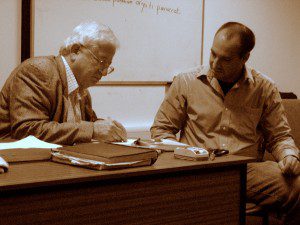
The Oxford Center for Hindu Studies has a lecture by Richard Gombrich very much worth listening to for those interested in early Buddhism. Gombrich is, for those who do not know, perhaps the greatest expert on early Buddhism in the world today. I highly recommend all of his books, lectures, and articles, many of which are available on the web for free. As I have on my ‘books‘ page:
Another author I’m very fond of is Richard Gombrich. His book on Theravadin Buddhism is essential reading for those interested in this particular school of Buddhism. There is also much said about the ‘foundations’ of Buddhism that will complement Gethin’s work above.
Once you’ve read some of these basic works, it’s well worth diving into What the Buddha Thought. I used this also in my Buddhist Philosophy class because Gombrich dives into some major questions regarding the Buddha’s teaching including the Brahmanic and Jain influences, and Gombrich tries to tease out a sense of what the Buddha might actually have been like. I appreciate his humble methodology (though he’d hate my using that word – he has a chapter against methodology in the book) of conjecture and refutation. After this book (or before, depending…) read How Buddhism Began: The Conditioned Genesis of the Early Teachings.
This latest lecture can be found here: http://www.ochs.org.uk/lectures/religious-experience-early-buddhism
The sound of the jack-hammer (pneumatic drill for those in England) makes some of the audio painful to listen to, especially in the Q and A, but there are still many gems to be heard.
The first gem is a reference to William James’ famous “Varieties of Religious Experience” (1901-1902) – which has a postscipt that until now I had never heard of. In it he wrote:
I am ignorant of Buddhism and speak under correction, and merely in order the better to describe my general point of view; but as I apprehend the Buddhistic doctrine of Karma, I agree in principle with that.
And in following well from my last post, Gombrich wryly notes that:
“The more that one studies early Buddhism, the more startled one is by how it is completely antithetical to the hippie culture. It is in every possible way. It is all about self-discipline, take care – means take care of your body. Notice what you’re doing, notice what you’re thinking, and control it.”
Gombrich also states that, unlike Tantra, the Buddha’s own perspective on special ‘powers’ attained through religious experience are unimportant and perhaps even to be avoided. And there is plenty more worth hearing. Here is the write-up:
Interdisciplinary Seminar in the Study of Religions/Mysticism Seminar
OCHS LibraryProfessor Richard GombrichFriday, 18 February 2011
This seminar examines accounts of religious experience in early Buddhism as gleaned from our textual sources. Of particular importance here has been the role of meditation and living an upright and ethical life.
Professor Gombrich was the Boden Professor of Sanskrit for many years. He is a world authority on Buddhism and has written definitive works on early Buddhism and the Theravada tradition. Among his publications are What the Buddha Thought, How Buddhism Began andTheravada Buddhism.











